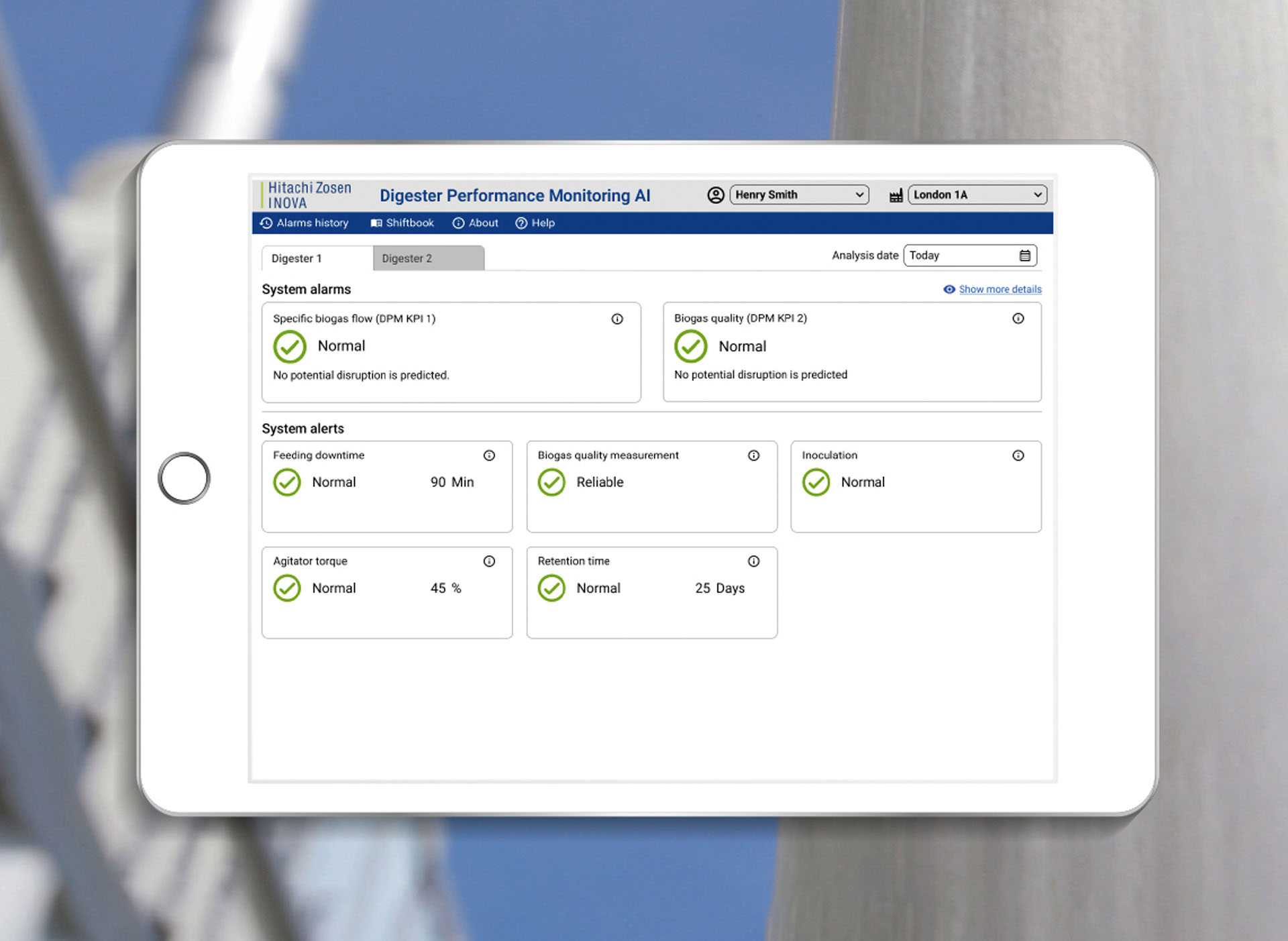
New AI-based System for Early Detection of Digester Biology Problems
Kanadevia Inova presents the DPM AI system, an innovative in-house development based on artificial intelligence designed to increase the operational reliability and productivity of anaerobic dry digestion plants. It processes data from the digestion process and points out deviations that can lead to yield reduction and malfunctions. Automatic real-time control replaces laboratory analysis and can be used in all dry fermentation plants with continuous anaerobic digestion.
Zurich, Switzerland Zurich-based Kanadevia Inova AG (HZI), a specialist in plant technology for the production of green gases, has developed its artificial intelligence (AI)-based Digester Performance Monitoring (DPM AI) system to make the operation and maintenance of its in-house Kompogas® dry anaerobic digestion (AD) technology even more efficient. The DPM AI system enables dry AD plants to be operated closer to their biological limits for an increase in plant productivity of up to 15 percent. It will come as standard in Kanadevia Inova’s newly constructed plants, but can in principle also be retrofitted to any existing plant with continuous dry AD in the mesophilic or thermophilic temperature range.
Time-Consuming Performance Monitoring
The process biology of an anaerobic digestion plant is prone to failure, mainly due to overfeeding of the biogas-producing microorganisms and ammonia, which arises as nitrogen-rich substrates are degraded and has a process-inhibiting effect. These and other factors can reduce biogas production and disrupt plant operation.
To get information on the status of the process biology, operators regularly take digestate samples and send them to a laboratory for analysis. Based on the results measured for volatile fatty acids and ammonia nitrogen, the laboratory data are analysed to determine any indicators of a malfunction in the digester. This process usually takes several days – days that elapse between the occurrence of a problem in the digester and its discovery. The longer the impairment to the process biology goes on, the more biogas production decreases. It can take months to return to normal operation.
Process Automated and Significantly Shortened
This is where the DPM AI system comes in. Kanadevia Inova’s Technology & Digitalisation division has developed an algorithm that takes into account various factors in a potential problem with the dry digestions process, evaluates them and issues a warning message in real time. For example, the system can rapidly determine an increase in the hydrogen content in the biogas as well as a decrease in the methane content in the biogas or specific biogas production. “The AI system automatically evaluates the plant data to detect incipient process disturbances within seconds,” explains Dr Benoît Boulinguiez, Director of Product & Marketing Management at Kanadevia Inova. “Unlike other software-based solutions that merely sound an alarm when threshold values are exceeded, our DPM AI system interprets the threshold values in light of the parameters for possible disturbances in the process biology.” In the event of an abnormality, the system triggers an alarm for the operating personnel so that countermeasures can be taken quickly. Boulinguiez goes on to emphasise the importance of innovative smaller systems and components: “Our plant technology, as well as the growing number of plants we’re building and operating ourselves, is helping efforts to boost circularity, decarbonise and ensure a secure supply of energy from renewable sources. At the same time we also strive to make the best possible use of input materials and maximise the gas yield.”
Stabler Plant Operation with Varying Substrates
The Kompogas® plant in Jönköping, Sweden, is the first facility to be equipped with the DPM AI system. It produces biogas from food waste and green waste collected from the region. This is used to generate renewable natural gas fuel for urban vehicle fleets as well as private cars, which helps decarbonise transport in the region. “The composition of the feedstocks delivered for biogas production varies, and this influences the digestion process,” explains Gunnar Holmstedt, managing director of the Swedish operating company of the Kompogas® plant. “So it’s particularly advantageous if any impairment of the biology is detected quickly. This has already been proven its worth in the evaluation of our plant data during the development and testing of the DPM AI system.” At the turn of the year it will be integrated into the Swedish plant to optimise its regular operation.
Manufacturer-neutral
The newly developed system is compatible with all Kompogas® plants and can currently be refitted to any facility in Europe and North America. It can also be fitted to dry digestion plants from other manufacturers. The costs, which depend on the number of plants to be equipped and their control system, are determined on a case-by-case basis.
Interested operators will be able get first-hand information about the DPM AI system at the German Biogas Association’s annual Biogas Convention & Trade Fair in Nuremberg from 12 to 14 December 2023. Kanadevia Inova will be at Stand D04 in Hall 8.